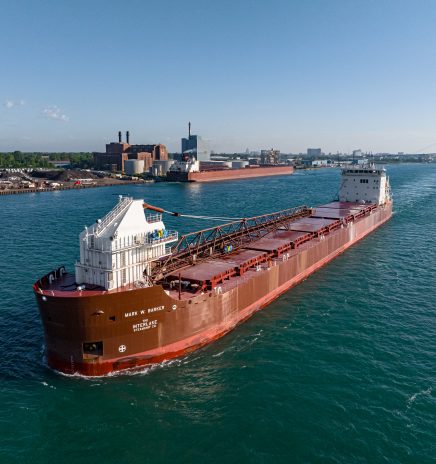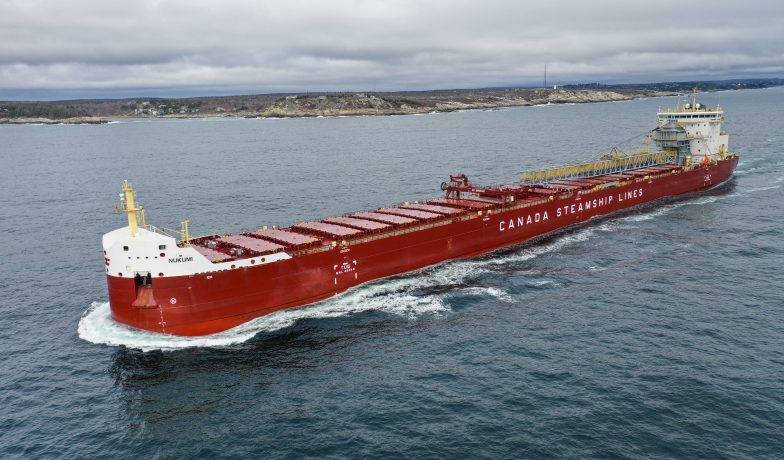CSL Leads in Sustainable Marine Solutions
Based in Montreal, Canada and dating back to 1845, CSL is the largest owner and operator of self-unloading ships in the world. Its operations extend throughout the Americas, Australia, Europe and Africa, with cargo deliveries to customers in the construction, steel, energy and agri-food sectors. CSL is ahead of the curve in using biofuel compared to some other carriers in the Great Lakes area.

“Unlike other shipping companies that are just getting started with their biofuel initiatives, we have moved past the testing phase and are running biodiesel as part of our business – just one of the many ways we are reducing carbon in our operations,” said Louis Martel, president and CEO of CSL. “In 2023, our biofuel fleet set a record by using 16,400 metric tons of B100 biodiesel in a single season, marking our highest consumption to date. This translates into an 80 to 90 percent reduction in greenhouse gas emissions, leading to the avoidance of 50,000 metric tons of CO2 across our Great Lakes fleet.”
CSL – which boasts 1,500-plus employees and 103 vessels and moves more than 50 types of dry-bulk commodities globally – initiated its biofuel journey in 2019 with a B50 blend. Since 2021, eight CSL vessels have run continuously on B100 for five to eight months per year.
“In 2024, eight of our Great Lakes ships will run on biofuel, and we hope to eventually extend the program across our entire Great Lakes fleet,” Martel said. “Biofuel offers a practical and low-risk solution toward a decarbonized marine industry, but we need government support to ensure it remains affordable. CSL is proud to lead the way in showcasing the effectiveness of biofuel, and we call on governments and industry stakeholders to accelerate the adoption of sustainable practices in maritime transportation.”
2023 Sustainability Report
When CSL’s 2023 Corporate Sustainability Report was unveiled in July, the study reflected the company’s commitment to transparency and accountability in environmental, social and governance matters, and it marked a crucial step in decarbonization. The company used 16,377 metric tons of B100 biofuel on eight vessels, increased the volume of its recycling by 6 percent, and used renewable resources for 8 percent of its total energy consumption.
CSL has also experienced a 29 percent reduction in carbon intensity since 2005 and seen a 3 percent increase in female seafarers in Canada. The latter is particularly significant, considering the whole shipping industry in the Great Lakes is seeing skilled employee shortages and preparing for even greater shortages in the coming years.
“The skill shortage in the maritime industry is real, but we are seeing a growing interest from women in this field,” said Stéphanie Aubourg, the chief human resources officer for CSL. “Currently, CSL has more women cadets than ever before. Women increasingly view the maritime industry as a place where they can grow and achieve their professional ambitions.”
CSL is actively working to create a welcoming and respectful environment for women, Aubourg said. The company’s reputation in the shipping industry helps CSL attract women who are looking for a safe, respectful workplace with ample opportunities for growth.
“At CSL, we are committed to supporting women in reaching their highest potential. And the increase in female seafarers is indeed interesting and reflects a broader trend. In my opinion, the rise in female interest in the industry is due to the reduced barriers they now face,” Aubourg said. “Women may have been interested in the past but felt the industry wasn’t accessible to them. Now, thanks to concerted efforts to create a more welcoming and safer environment, women feel that the maritime industry is a place where they can thrive.”
When team members from CSL have visited area schools, they have witnessed many young women studying maritime subjects and aspiring to become seafarers, Aubourg said. There seems to be more of an interest in the maritime industry than ever before among female students.
“There’s a snowball effect at play; seeing other women succeed in the industry inspires more women to follow in their footsteps,” Aubourg said. “The more success stories we have, the more we can demonstrate to young women that a career in the maritime industry is not only possible but also a place where they can succeed.”
Promoting the Industry
To combat the unprecedented labor shortage of late, companies like CSL must actively work toward attracting talent from the entire population.
“Making the industry more welcoming and accessible to women is essential to ensure we have the workforce needed to operate,” Aubourg said. “Women make excellent seafarers and are just as capable as their male counterparts. Their inclusion is vital to overcoming the labor shortage and ensuring that we have all the qualified personnel required to keep the industry running smoothly.”
Additionally, diversity within the crew at CSL brings numerous benefits. It enhances safety performance, improves decision-making, and leads to more efficient vessel operations, Aubourg said. A diversified crew is a strategic advantage for CSL and the maritime industry.

Advancing Agricultural Prosperity Among Great Lakes Shippers and Suppliers
Meeting for the second time in Grand Rapids, Michigan, on Dec. 4, 2025, the Great Lakes Alliance for Sustainable Shipping (GLASS) drew more than 80 attendees from across the Midwest agriculture and transportation industries. Those attending included trucking companies, marine... Read More

Great Lakes Iron Ore Trade Nearly Matches January 2025
Iron Ore shipments on the Great Lakes totaled 2 million tons in January. According to the Lake Carriers’ Association, this total is a near match to 2025. Loadings were below... Read More



